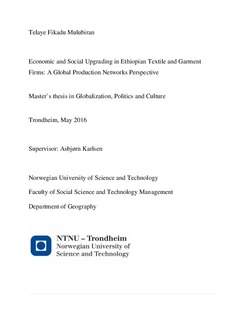Economic and social upgrading in Ethiopian textile and garment firms : a global production networks perspective
Master thesis
Permanent lenke
http://hdl.handle.net/11250/2449792Utgivelsesdato
2016Metadata
Vis full innførselSamlinger
- Institutt for geografi [1112]
Sammendrag
The insertions of developing countries into global economy have ensued a new challenges and opportunities to their firms and workers. The issue of social upgrading in general, and the link between economic and social upgrading in particular is not thoroughly explored despite recently emerging literatures. This study aimed to contribute to the growing literatures in the field through examining the link between economic and social upgrading, and the conditions under which social upgrading is achieved in the context of global production networks. It examined five textile and garment firms in Ethiopia through employing qualitative research approach and case study research strategy with semi-structured interview and focus group discussion being the major data collection instruments. The data was collected from government offices, employers association, trade unions, supplier firm managers, and workers which enabled to capture the perspective of different stakeholders about the issue under investigation, and ensure the validity and reliability of the study.
This study showed that the link between economic and social upgrading is not linear as assumed by neoclassical economic theory. It has identified different institutional conditions mediating the successful transformation of economic upgrading into social upgrading. The contradictory commercial requirements of global buyers for fast delivery time and lower price, and their simultaneous demand for quality products have contributed to casualization of employment, increased work intensity and overtime work, and squeezed the wage rate of workers preventing social upgrading outcomes. Besides, the position of firms and workers within global production networks where entry barrier is lower and competition is higher has also averted the social upgrading opportunity of workers for skills training and wage increment as such position requires less skilled labor force and involves intense price based competition. The social and institutional embeddedness of supplier firms and conditions internal to the operation of firms (such as machinery dysfunctionality, workers absenteeism, and electric power interruption) have also lead to increased work intensity, compulsory overtime work, and casualization of employment.
This study also showed the central role of labor unions, and national labor regulatory frameworks in facilitating the social upgrading of workers provided that certain institutional conditions are meet. Hence, economic upgrading does not guarantee social upgrading as claimed by neoclassical economic theory. Rather, it depends on a wide variety of institutional factors involving the interplay between capital, state, and labor as argued by the institutionalist perspective.
Utgiver
NTNUBeslektede innførsler
Viser innførsler beslektet ved tittel, forfatter og emneord.
-
Life Cycle Assessment of an Ambitious Upgrading of an Apartment Building - An Environmental Approach on Upgrading Projects
Wrålsen, Benedikte (Master thesis, 2016)A Life Cycle Assessment (LCA) is conducted of an ambitious upgrading of an old apartment building to assess environmental impacts caused by construction materials and related processes. The result of the LCA is compared ... -
The role of local actors in transforming economic upgrading into social upgrading in Ethiopian textile and garment firms
Mulubiran, Telaye Fikadu; Karlsen, Asbjørn (Journal article; Peer reviewed, 2021)This paper contributes to the growing literature on global value chains/production networks by examining links between economic and social upgrading in a developing country where industry policy and employment legislation ... -
Evaluation and upgrade of the Telemark flood model
Addo, Louis (Master thesis, 2016)Flood forecasting models are important tools that could be used to find the optimum way to operate hydropower reservoirs in order to reduce flood disasters of especially human settles close to these reservoirs. The flood ...
